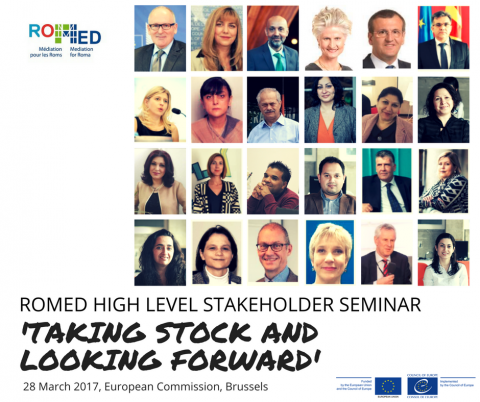ROMED High Level Stakeholders Seminar "Taking Stock and Looking Forward"
On 28 March 2017, the ROMED Joint Programme of the Council of Europe and European Commission reached its closing phase through a seminar organised within the European Commission’s Berlaymont Building, entitled “Taking Stock and Looking Forward”. High-level representatives of the European Commission, including First Vice-President Frans Timmermans, as well as two Members of the European Parliament (EPP Group), Ms Corazza Bildt and Mr Cristian Preda, addressed the audience during the opening. The Council of Europe was represented by Ms Snežana Samardžić-Marković, Director General of Democracy, who reviewed current and future co-operation between the Council of Europe and the European Commission on Roma-related issues. The tone of the seminar was set by these high level stakeholders, who spoke about the European context for Roma inclusion, the challenges ahead in terms of normalisation of intolerance, the democratic deficit and education being the key to avoiding the vicious cycle of poverty and combatting discrimination.
Mr Valeriu Nicolae, Special Representative of the Secretary General of the Council of Europe for Roma Issues, presented the “10 priorities for 10 years” for Roma inclusion during his introduction. Some of the 10 priorities included the need to reduce by half school drop-out rates of Roma and Traveller children, to increase the number of Roma and Traveller youth with secondary school diplomas, and to double the number of Roma and Traveller elected representatives in local or regional councils, national and international parliaments.
The main topics of the seminar revolved around the impact and results of the ROMED Programme, reinforced by the contributions of Ms Aurora Ailincai, Head of the Strategic Partnerships Unit in charge of the implementation of the programme within the Council of Europe, and Ms Mariana Milosheva-Krushe, Head of the External Evaluation Team.
More than 80 stakeholders participated in the seminar, including representatives of governments, members of the ROMED National Support Teams, Roma mediators who provided testimonies within the two panels dedicated to the ROMED1 and ROMED2 phases of the programme, and other international organisations. The seminar was concluded by a round table focusing on co-operation between the European Commission and the Council of Europe on Roma integration with the participation of Mr Adam Tyson, Acting Director for Policy Strategy and Evaluation, Directorate-General for Education, Youth, Sport and Culture, Ms Marie-Hélène Boulanger, Acting Director for Equality and Union Citizenship, Directorate-General for Justice and Consumers, Ms Emmanuelle Grange, Head of Disability and Inclusion Unit, Directorate-General for Employment, Social Affairs and Inclusion, and Mr Colin Wolfe, Head of Unit, Western Balkans Regional Cooperation and Programmes, Directorate-General Neighbourhood and Enlargement Negotiations.
Although the ROMED Programme has now been completed, its methodology will still be used within various contexts. The dynamics created through the programme will continue working towards the elimination of the barriers that prevent Roma citizens from participating effectively in decision-making and active life in local contexts. Furthermore, several new municipalities in various countries have already expressed both an interest in, and intention of, adopting the ROMED process in the future.
During the event, a new ROMED publication was presented entitled “Experiencing ROMED – A legacy for improved participation in Roma communities”. This publication contains examples of how Roma participation was achieved with the support of the ROMED programme, as well as the full evaluation report. The publication is available for download online: http://coe-romed.org/content/resource-3441

